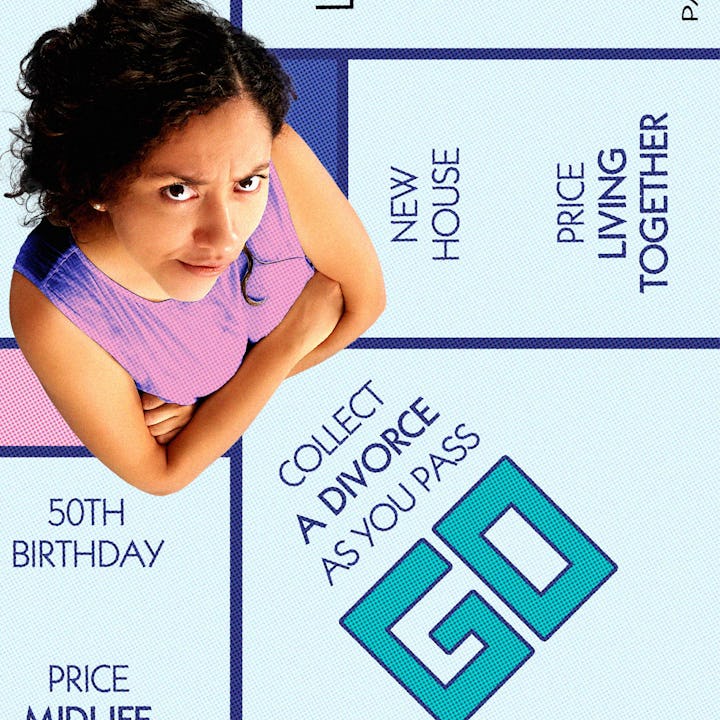Is The “Milestone Divorce” Really A Thing?
If it seems like all your friends leave their spouses after turning 40 or getting a new job, well, that tracks.

Even though the U.S. divorce rate hit a historic low during the COVID-19 pandemic, there’s a good chance you know some couples who decided to call it quits as the world opened back up. Or maybe you’ve got the friend who turned 40 and said “sayonara” to her spouse. There are also the couples who split once their kids leave the nest, or those who part ways during other major life changes, such as a job change or a big move. Is the milestone divorce really a thing, or does it just feel that way?
It’s not just you or your social circle, according to one clinical psychologist, who tells Scary Mommy that it’s not at all uncommon to seek a divorce during an unrelated life change. In fact, there are several reasons why this happens, as Terri Bacow, Ph.D., a cognitive-behavioral psychologist and author of Goodbye, Anxiety: A Guided Journal for Overcoming Worry, explains.
Milestone Divorce 101
“During major transitions and life changes, priorities shift,” says Bacow. “Many people realize how unhappy they have been in their marriage and wish to be happier in their lives.” A life change — either positive (like a new job or a big birthday) or negative (like a global pandemic) — can be the catalyst for someone to look more closely at their relationships and personal happiness. And yeah, Bacow likens it to an “epiphany” of sorts. “Either a tough circumstance (like COVID or a serious loss) can make one realize that ‘life is short and I don't have to put up with this’ or a fortuitous circumstance (positive job change) can make a person suddenly happier and realize, ‘I want to continue feeling this way.’”
Turns out, there’s a psychological component at play here, too. “Transitions can be a catalyst for change,” Bacow notes. “They cause people to step outside of their comfort zone and ultimately to grow. Not only do major life changes cause priorities to shift, but perspectives also shift. Big changes enable people to see things differently and often more clearly.”
“Much of this has to do with happiness, i.e. realizing that you have been unhappy and that you can be less unhappy if you make these other changes as well,” she adds. “Experiencing and surviving a large change without catastrophe (or even if there is a disaster) allows people to become less afraid of change and open to other changes in their lives. They become more resilient in the process and open to other shifts.”
So what if you’re the one in the driver’s seat, signing the contracts on a new job title or sending the kids off to college? How do you know if the next order of business is divorce? “A sign would be if your relationship is stagnant and if you feel you and your spouse have become ‘roommates’ or if the level of conflict in your relationship becomes untenable,” says Bacow. Of course, if you are in a relationship where there is verbal, physical, or emotional abuse of any kind, the safety of you and your children is of paramount importance, and leaving safely is not always easy or simple.
But if your relationship has simply run its course, it might be time to explore the next chapter of your life solo, and that’s great. On the flip side, your spouse might also be examining your relationship. Bacow notes that “it can be hard to tell if your spouse is feeling similarly, especially if there has been a breakdown in communication.” She says that if they seem especially distant, are withdrawing and/or spending considerably less time with you, they might be physically or emotionally checking out.
Pros and Cons
If you find yourself in this situation, it’s normal to feel uneasy about a new season of life without your spouse by your side. “Change is scary but can produce tremendous growth,” says Bacow. “It can lead to so many new opportunities and new relationships. It may feel difficult to navigate multiple changes at once, but it will surely build growth and resilience. Managing and navigating hardships does, in fact, make us stronger and better able to deal with whatever life throws our way.”
Of course, it’s also totally fine to try and stick it out until you’re out of a transitional stage. “It can be optimal to pace yourself,” Bacow adds. “Too many large changes at once can quite frankly be too overwhelming. It is incredibly important to look out for one's mental health, especially when there are large changes underfoot.”
She continues, “When we are going through a major transition, ‘one step at a time’ is a smart approach. You do not want to overload yourself, which can lead to burnout. Take a moment to find stability and acclimate to your new life circumstance before diving into something else that could be destabilizing.”
No matter the scenario, talking to a therapist can help you navigate your feelings, which might make your decision-making a little bit easier. But know that you’re not alone and that you will get through it all. Seasons always change, and they will here, too.
This article was originally published on